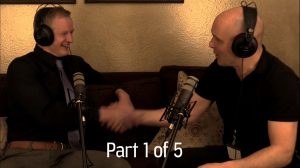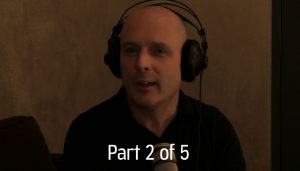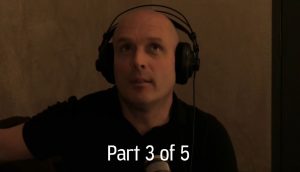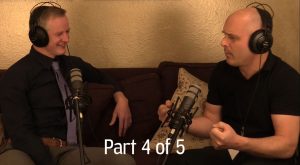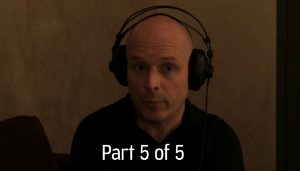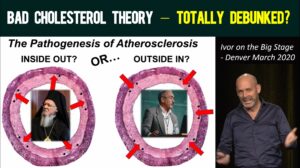Ivor Cummins 00:55 I’m in Washington, D.C. with Nadia Petiguana who works for Dr. Jason Fung and Megan who many of you may know with the Intensive Dietary Management Program. So great to meet you, Nadia.
Dr. Nadia Petiguana 01:08 Thank you, Ivor. Nice to be here with you.
Ivor Cummins 01:10 Great stuff. You know what, I just watched your talk there at Dr. Berg’s Keto Summit, a fantastic, enthralling talk, and I loved a few things. Well, I love many things. But you’re bringing up insulin resistance, which I’m into, also TOFIs (thin-outside-fat-inside.) And of course, the whole problem of PCOS which is huge for so many women and infertility. So I think this can be a really fascinating podcast for so many women out there to learn how to resolve it. And it’s not even that complex in the end.
Dr. Nadia Petiguana 01:42 It really isn’t. Thank you.
Ivor Cummins 01:44 So your personal story, I think, if you could run through that, that kind of says it all, and then we can delve into certain aspects.
Dr. Nadia Petiguana 01:51 Absolutely. As you said, I work with Megan Ramos and Jason Fung at the IDM program. I’m one of the IDM educators, so a dietary and fasting coach. So I started working with them in 2016. So just over three years ago, and I’ve been working with them ever since. So how I got there is actually a bit of a funny story, as you said, there’s a bit of a personal story behind. I was trained in Toronto as a naturopathic doctor. So that was 15 years ago. I graduated from the Canadian College of Naturopathic Medicine and I became a naturopath. Because when I was in college, when I was in university, full intention to go to medical school, I got really upset with my personal medical doctor because I had IBS, irritable bowel syndrome. And so that’s how my journey started as a naturopath. I was upset with the conventional medical community for not helping me with IBS, irritable bowel, which is you know, pretty… it’s in and of itself has its own serious concerns, more debilitating, you know, uncomfortable. And so I decided I’m going to become a naturopath. I had heard of it. It was a pretty intense four year program, very good science, background and all of that. So I thought, “This is what I want to do and naturopathic medicine is going to treat my IBS.”
03:08 Fast forward a few years later, and unfortunately, that didn’t work. Naturopathic medicine didn’t treat my IBS, but it was part of my journey. And so when I graduate, right after I graduated, I decided to go back to my home country. So another personal part of my story. I was raised in Canada, but I was born in Mozambique. So Mozambique is an African country, Southeast Africa, right on the border of South Africa. It used to be a Portuguese colony. So my background is mixed Portuguese-African. And I was born in ‘77, and left Mozambique just after I was one and eventually my mother and I immigrated to Canada, which is where I was raised.
03:50 So little bit of the Jason Fung connection there. But the funny story, it kind of does a U-turn here, is that once I graduated from the Canadian College of Naturopathic Medicine, I decided to go back to my home country. And as I said today in the lecture, I thought I was going to go to Mozambique to help starving African children. I had that dream of, you know, young African kids that study abroad often think, “I’m going to go back to my country and make a difference.” And it didn’t happen. I tried to work for public health, and I wasn’t given the opportunity. So the only opportunity I was given was to open a private practice as a naturopath. So what does a naturopath do in Mozambique? Not very much.
04:31 So when I opened my practice, I was shocked to find out that there was a lot of interest in coming to see me because people wanted weight loss advice in Mozambique. And I’m from Maputo, which is the capital of Mozambique, very happening city. And I was very busy. For 10 years, I lived and worked in Mozambique. Not as a naturopath per se but as a dietitian, so that I had to make up a diet because I didn’t learn that in school. And I guess I was fortunate enough to not have guidelines to follow. My dietary advice was probably a Whole Foods lower carb type of diet. Eventually it got into a stricter lower carb diet.
05:14 But long story short a few years into my professional life and personal life, my husband and I started trying to conceive, and I find out that I have PCOS, polycystic ovarian syndrome. The funny thing is, and that was part of my story today, I was very thin. So I was never overweight. And I learnt a lot in this journey, in this PCOS infertility journey. And I was lucky, I guess, because I believe in karma, and all of these things kind of came together. I became a naturopathic doctor, I went to Mozambique and started working in diet and nutrition, which I never thought I would, then I developed this condition, PCOS, and I didn’t have very much help. My medical doctors weren’t very helpful. So then I had to, again put all the things that I knew together and try to figure out how to help myself.
06:04 So here’s what I knew in those first three to four years that I started working as a dietitian in Mozambique, helping people with weight loss. For whatever reason, a lot of the women I worked with, that came to me for weight loss got pregnant in the meantime. As I say, with a little help from their husbands, but I had this strange reputation for helping women get pregnant. They didn’t know why and I didn’t know why. They weren’t coming to me to get pregnants initially. And so when I started struggling with fertility, I went back to that. I thought, “They’re getting pregnant, so I might as well. So let me change my diet to the diet I was telling people to do even though I was very thin.” I knew there was a connection because once I got off the birth control pill, I gained a lot of weight, mostly in my central area, central obesity, which is a big part of PCOS, obviously stopped menstruating and ovulating, which is a big problem if you’re trying to get pregnant. And I didn’t have a really great solution for my doctor except for fertility treatments, which my husband wasn’t very keen on.
07:06 And so I went home and I decided, “I am going to do this strict low carb diet that for whatever reason is helping.” And this was back 10 years ago, “… that for whatever reason is helping my clients get pregnant.” And lo and behold, Ivor you know the rest of the story, I did. I got pregnant very, very shortly after that. I think within a month or two,
Ivor Cummins 07:26 But at the time, Nadia, you are not thinking, “Oh, I’m probably insulin resistant.” “I’m probably TOFI.” Low carb is obviously the dramatically the best intervention for that. You just really went on the pattern recognition that your overweight patients, you’re giving low carb, they were losing weight, and they were getting pregnant. So it was literally that. Just copying a pattern that was successful.
Dr. Nadia Petiguana 07:48 100%. And so much so as you know Ivor, that I didn’t even follow the diet when I was pregnant, which was a big problem.
Ivor Cummins 07:55 Yeah, and that was really fascinating, because when I was watching your talk, and you within a month I believe, on a low carb diet, you lose some weight, you were very slim in appearance, you showed a photo, but you obviously had some internal fat and you had this problem. But within a month you’re pregnant, you’re delighted. And then suddenly the story takes a kind of shocking negative turn.
Dr. Nadia Petiguana 08:17 That’s right.
Ivor Cummins 08:18 Yeah. So maybe describe that.
Dr. Nadia Petiguana 08:20 That’s right. So that’s exactly what happened. So the diet worked. The low carb diet for whatever reason, which I didn’t know at the time, helped me lose weight very quickly, and help me menstruate the very next month. And I got pregnant. So, pretty quick, probably too quick to be honest, because I threw the diet out the window. I didn’t think twice about it. Now I’m pregnant. And so that’s all I cared about. What happened with me, which is what happens with many women, and there’s clear evidence and science on this is that women with PCOS, women that have metabolic syndrome, and as you said, you’ve alluded to, insulin resistance, and that’s what I discovered later, are a much higher risk for serious pregnancy complications. And I unfortunately, had lots of them. Lots and lots of pregnancy complications, including preeclampsia, hypertension, higher blood sugars, emergency c-section, and then later severe postpartum depression. And my first child was actually in the NICU for something that I think may have been related from some of the things that I’ve read. So I didn’t follow the diet while I was pregnant. It helped me get pregnant. I got pregnant too quickly. I didn’t follow it long enough. Then I got pregnant, and I had a lot of complications.
09:34 So this is a syndrome that’s on a spectrum. And metabolic syndrome is on a spectrum. And insulin resistance is on a spectrum. And I think over the course of the pregnancy and all of these complications, I went further up on the spectrum, and things just got worse and worse and worse.
Ivor Cummins 09:49 Yeah. There are only a couple of naturally insulin resistance states, pregnancy is one of them and then puberty is another. So yeah, it would have been crucial, though you didn’t know what to maintain the diet through that very pregnancy. But you went back to just a generic diet, I guess.
Dr. Nadia Petiguana 09:48 Not generic, worse than generic. I had a history because of the PCOS likely but also my own predisposition to eating a lot of sugar.
Ivor Cummins 10:15 Yes, and carbohydrates. And this is something you also went through that a lot of people ironically and tragically, not only are they eating too much carbohydrate driving their metabolic syndrome, but in turn their metabolic syndrome and their state is making them kind of addicted to seek out more carbohydrates which is a classic vicious cycle and I think underpins the obesity and diabetes explosion this century.
Dr. Nadia Petiguana 10:38 And the same thing happens with women with PCOS. They don’t eat too much. They don’t eat too many calories. They don’t eat too much fat. They eat too much sugar and they’re in this constant carb sugar negative spin and addiction probably which is what I felt that I had. I didn’t know that at the time.
Ivor Cummins 10:57 And it appears that and we kind of largely know now the medical professionals well meaning as they are, they can’t help you with that because I think many don’t grasp it. As you said the doctors just saying, “Well, here’s a drug for what you’ve got, you’re going to get worse.” “Here’s a drug; eat less move more,” which is pointless to someone who’s caught in a kind of an addictive cycle and trapped in that merry go round, or miserable go around, probably better to say.
Dr. Nadia Petiguana 11:20 I wasn’t eating much to begin with. I didn’t even like food. I only liked sugar. Probably one of the main reasons I was so thin was because I just didn’t eat enough, but I definitely didn’t eat food. And so telling me, “You’re going to be obese…” this is what my doctor first told me when I was diagnosed with PCOS, “Well, you’ve got PCOS.” He was shocked because I was so thin but clearly I had it and I had all three diagnostic criteria. So I had the frame type of PCOS which he was shocked about but I did because lifestyle, right? I would likely had the tendency. It’s probably a multifactorial concerned but my lifestyle is what made this condition much worse. And I didn’t eat very much but I eat sugar all day long. Every hour or two basically.
Ivor Cummins 12:09 Yeah, and your genetics, we often talk about this, your genetics may have given you a susceptibility towards damage from a bad food environment, but the bad food environment is the cause. It always is. The genetics only gives you susceptibility, or the genetics loads the gun, but the environment and nutrition pulls the trigger.
Dr. Nadia Petiguana 12:26 That’s what you said yesterday. And I completely agree with that. The funny thing is, I think what my genetics did, I am the daughter of a very thin woman and a very thin man. Both my parents are still very thin to this day in their 60s. And so that’s my genetics is that I was eating all of this crap, as you know Ivor, all of this sugar, and yet I wasn’t gaining weight, like some people are. So I didn’t even have that red flag.
Ivor Cummins 12:53 Exactly. The warning sign. Well, my specialized areas, heart disease as you know, and again, the TOFI, or the thin-outside-fat-inside is a huge issue in heart disease, because the big fat guy with the bad bloods, well, they know they’re at risk, and they have a choice to do something. But the slim person who appears to be healthy, they dropped out of heart attacks as well, just as much pretty much but they have no warning and they feel that they’re healthy, which is a tragedy. So you’re trapped in the same kind of paradigm, the same problem. And that pregnancy then, your first pregnancy, lots of complications emergency c-section, and I think followed by your depression issues as well, which is shocking. So how was that period? It must have been really bad.
Dr. Nadia Petiguana 13:35 It was the roughest unfortunately, especially because you’ve just had the most beautiful baby in the world and you should be thrilled. So that comes with its own thing, I guess.
Ivor Cummins 13:47 Guilt, I guess.
Dr. Nadia Petiguana 13:48 Well, I don’t even know that at the time. You can really put any of this really. When you have severe postpartum depression like I did, and it expresses itself as severe anxiety… soon enough, I was medicated, probably not soon enough to be totally honest, but eventually I was medicated, because I was in such a state at that point. And so how did that have a major impact? 1) the medication I was given caused some serious weight gain. And I’m talking over 20 pounds in post pregnancy. So post pregnancy weight. So remember, we’re talking about that spectrum. I’m just going up and up on the spectrum at this point, right? Because now I’ve got everything else, plus the weight, plus all of this.
14:30 So that was one of the major things. And 2) head wise, I wasn’t in a good place to even say, “You know, Nadia, you need to go to that diet. That diet might help or even to make the connection between PCOS and diet and insulin and all of that.” I just was in no place. I probably didn’t even work for the majority of that. I had to go into the clinic, but to be honest, I didn’t do very much. I wasn’t in a good place.
Ivor Cummins 14:57 Yeah. So then you were moved on to how did you actually snap out of that. And I think from recollection, it was more using some medical professional help to go after a second pregnancy. So maybe capture that story, because that will be common to so many women who are not aware of low carb to resolve PCOS and fertility issues and they end up in the system.
Dr. Nadia Petiguana 15:19 That’s exactly it. So it worked the first time. Great. I didn’t continue it. I got much worse. My PCOS got worse. Doing one a month of a low carb ketogenic diet is not going to solve this as we know, right? This is a lifestyle. It’s not a temporary fix. And so if you have a condition like PCOS, or diabetes, or obesity, it’s not doing anything for a month or taking a magic pill that’s going to resolve the problem.
15:46 So what happened with me again, part of my own personal journey was that a little less than two years after my first daughter was born, I developed a large ovarian cyst that nearly ruptured and it had to be surgically removed. And my doctor, my gynecologist at the time said to me it’s now or never. Literally. If the way this went four centimeters to seven centimeters cyst grew so quickly, you know, you’re probably thinking insulin. How is this thing growing so quickly, right? He’s saying to me, “You’re probably not going to be able to have a child because you’re going to have lots of these cysts. They’re going to rupture. They’re probably going to strangulate your ovaries. You’re going to be out of ovaries soon.” This kind of doom picture. “You need to try to have a baby now. And here’s some more fertility drugs.”
16:33 And so I went home, in a bad state, mentally physically, took the fertility drugs for six months. That’s what was recommended, and I didn’t get pregnant. Because this time, I didn’t do the diet. I didn’t even think of the diets. I took the fertility pills instead. And I didn’t get pregnant because they don’t address the root cause of my problem, which was PCOS, as you call it. So a friend of mine who is a gynecologist, she’s the one that in a personal conversation said, “Well, of course, you’re not going to get pregnant, not even with a fertility drug because your problem is insulin resistance. You have PCOS.” And that to me was like the light bulb moment. How did I not know this? After all these years and after so much studying naturopathic medical school and seeing these women get pregnant, how did I not make the connection? But then I did. Then I made the connection.
17:27 So to help me out, she gave me Metformin, which is a diabetic drug, which does help the body become more sensitive to insulin. And that’s likely what helped me get pregnant that time around. And just like the other time, no diet during that second pregnancy, but I had a beautiful, a second beautiful baby girl. And I came out of that pregnancy in a very bad place physically. I actually developed a thyroid tumor that turned into carcinoma. But in a very good place, mentally, in the sense that it felt different. I didn’t have the postpartum depression, and I had a lot of information, very good information. And that’s when I decided to put all of this information together, that I had for myself, and to go on a low carb ketogenic diet and intermittent fasting full time. It helped resolve my sugar cravings, my sugar addiction, because by eating full meals I stopped snacking and grazing and eating sugar all the time. So that to me was essential and probably to many women with PCOS, “I needed full meals,” “I needed to eat and walk away” and that’s when the intermittent fasting comes in.
18:38 And in three months I was off the blood pressure meds. I was off the the glucose meds. Everything normalized. My body weight. Because at this point I’m pretty high up on the spectrum, right? Weight and everything else. Weight, blood pressure, blood sugars, obviously the mood was an issue, IBS, remember the IBS why I became a naturopath to begin with? That somehow got resolved. And so it was just a very interesting journey, and just three months after, eventually when I started doing this, and it’s been five, almost six years now.
Ivor Cummins 19:13 Right, long term and they talk out there on the internet and a lot of orthodox circles questioning the long term. We don’t have long term data for low carb ketogenic. But the reality is we have an enormous number of n equals ones who are experiencing amazing health and wellness and mental vitality. The answer is kind of obvious that this is a great human diet. And you lost and you’d probably put on quite a lot of weight as you say, you’d gone up the spectrum, so you were maybe losing, for a small frame person, you were losing 20 pounds maybe.
Dr. Nadia Petiguana 19:45 Oh, maybe more.
Ivor Cummins 19:46 Maybe more?
Dr. Nadia Petiguana 19:47 Maybe more. I wouldn’t be able to tell you exactly the amount because we’re talking baby weights and after baby weight, after depression medication and so on and so forth. But yeah, I can tell you that in three months, I was down to just a good place, good place mentally, physically, weight wise. And I guess we easily forget, right? Because I was thin before and then I was thin, people just assume, “Well, you’re thin because you’re always thin.” But no, because I was way up there on the spectrum already at that point.
Ivor Cummins 20:19 And you can imagine that journey back to that slimness, if you tried to do it with eat less and move more. I mean, the classic failure where everyone fails. So the addictive nature, I might just come back to that again, that people don’t always fully realize this vicious cycle. I think it’s a very pivotal part, that you’re kind of helpless in a sense, because of the addictive element of the sugars and carbs. So you’re continually drawn to eat those, which actually not only is really bad for you and driving all your problems, of course, but it’s taking out of your diet, nutrient dense meat, fish, eggs, and real food. It’s replacing what should be there. So it’s a double whammy, I guess.
Dr. Nadia Petiguana 21:01 I was sharing this with you as we were walking here. I 100% agree because that was my case. First of all, because I was thin, there was never this idea that I have to eat this versus that. There’s this myth that thin people can eat whatever they want. Because they don’t gain weight. And so I was never concerned about my diet. I had lots of candies, lots of chocolate, lots of Coca Cola, lots of lattes with lots of sugar, and bread. This is all I ate. This is all I liked to eat. And the more I ate, the more I wanted to eat. And it was this vicious cycle that I couldn’t get out of. Didn’t even want to get out of. Why would I need to, until I couldn’t get pregnant, right? Because up until then, why would I want to get out of this cycle?
21:42 I was that person that would go to restaurants and never order a main meal. And my husband can attest to this because this is the first couple years of our dating life. I would only have the starters, and the dessert. I like the starters and I like the dessert. I don’t like the main meal. This was me, and I probably would go back to that if I stopped eating whole foods, if I allow myself and so I don’t snap. To this day, I have much more metabolic flexibility. Meaning that I could eat all kinds of Whole Foods if I wanted to at this point, but I need to eat full meals. I need to eat proper meals, proper nutrients first. So if I start a meal or if I start snacking, I never snack. Because if I start with sugar, I can’t stop. And very likely, I will not eat anything else because I will not want to. I lose the appetite. I’m sure it’s not as bad today, but I don’t do it anyway. Like, I won’t start a meal. Even at an event, at a party, at a holiday, I will not start with the sugars, with the snacks, with the carbs because I won’t be able to then eat the meat and the veggies, which is what I want to eat. I need that first. I need to say, “She ate with real food, that doesn’t eat good. I feel good. And then maybe if you have the metabolic flexibility, maybe you can have some carbs.” And really, that’s depends on where you are on this famous spectrum.
Ivor Cummins 23:06 Yeah. And it’s so important that for children as well, I always say to the kids, okay, there’s some stuff there, there’s junkie or there’s breads or something like that they want to eat, “You eat the meat first. You eat real food first and if you want to force some crap down on top, that’s bad enough but get the real food in first.” It’s a golden rule.
23:26 And your whole family then I think Nadia benefited from these realizations. You know your husband, you showed a photo, your husband, he was chunky enough, but then you showed the later picture, which your kids are beautiful and they’re growing up now. The whole family is benefiting from this low carb lifestyle.
Dr. Nadia Petiguana 23:43 Well, my husband was overweight his entire life as a child. And really, he recalls back growing up in Mozambique in the ‘70s, he was the only overweight child. Everybody else was thin and he was overweight from always. And so obesity has always been a struggle, major struggle for him. We actually met obviously, personally, we had personal friends, but he came in to clinic to see me. That was one of our first interactions, not the first, and right away I was like, “Hmm, I don’t think you should be coming to see me anymore.” But his main concern was always weight. And so we’ve been on this journey together from the very beginning. It’s now been 12 or 13 years of him following this journey with me.
24:33 And so, to his dismay, there were many times where I tried many different things with him. Low calorie, vegan, and I’m sorry to even mention this, but we tried, we tried many things that we’re seeing and thought to be very helpful and it wasn’t helpful for him. When I decided to do a low carb ketogenic diet, he actually encouraged it very much because he had been wanting to do it for a long time. And I was always like, “No, no, that just can’t be healthy to do that kind of stuff.” There was a lot of this conversation back and forth. And so eventually, we both went on the low carb ketogenic diet together and intermittent fasting. You know, I’ve often mentioned this, his very first fast as soon as I started working with Megan and Dr. Fung was a 12-day fast. We were very lucky that I worked with Megan and Dr. Fung and he was properly monitored and he wanted to do it. Because the very first video that he watched of Jason Fung on YouTube, he went, “Really? This is brilliant. Why didn’t anyone ever tell me?” And he’s a very much matter of fact, kind of a person. And he was like, “If this is what I have to do, or if this is going to work, I’m going to do it. If I can do this, I’m going to do it. I can do it.” And he could. And he wrote a beautiful journal (I asked him to) throughout that period of time, and that’s what started it off. So now he’s this fit 45-year-old, vibrant, healthy man, when he suffered with obesity his entire life.
Ivor Cummins 26:34 Yeah, and the solution is actually well, obviously, Jason’s fantastic and Megan, and it’s great the way he can translate a lot of the complexity down to simple concepts of insulin. I love the whole balloon imagery and all the other analogies he used for fasting. But ironically, it is actually not that complex once all the details have been worked out. It’s easy to apply and it’s healthy ancestral food, and also the fasting behaviors which will be part of our evolution, let’s be honest. It’s not that complex, once you have someone to guide you and convince you that it’s correct, explain it, and then personal motivation takes over. As you say, your husband once he realized this makes sense, “I’m going to do it.” And he does the 12 day fast?
Dr. Nadia Petiguana 27:20 Yeah, he did. That was his first fast and, and he’s done a few extended fast since. Quite a few actually. He has a lot of fasting flexibility. It really works for him. He feels really great. He was very lucky to at the time that he had us watching him and he was very healthy throughout. He’s well hydrated. We at IDM don’t even recommend extended fasts all the time. Even in certain cases, we don’t recommend them at all. But in his particular case, it made sense. So he’s done since then a lot of alternate day extended fast, intermittent fast. I don’t think he’s done a 12-day, since. Not that I can remember but he may have done some five days, six days, seven day on occasion, but most of the time we’re doing intermittent fasting. He’s doing intermittent fasting, and he feels great.
Ivor Cummins 28:07 Yeah. Myself actually 24, 30 hours maximum. But many days, I do OMAD (one meal a day) and I do kind of the 24 hours and have a really good meal and then really enjoy it. And it works for me too, to be honest. But the longer term fast as well, it seems that women as well maybe sometimes are less amenable to very long term fast compared to men for whatever physiological reason. Is that a thing?
Dr. Nadia Petiguana 28:30 You know, that can be true. And Megan has done some great videos and blog series on women and fasting and the differences between men and women hormonally. Not to say that I think women can’t do extended fast because I work with women, men as well. I work with diabetics and obese people, not just PCOS people. And I have seen women do very well in certain cases with both extended fasting and intermittent fasting. It just has to be done properly.
Ivor Cummins 29:00 Right. Well, actually that’s a great resource. Megan, I look up IDM and Megan’s videos, sounds like that’s a one stop shop.
29:08 So maybe we’ll curl to a close now. I know you have other business to attend to. And just recap on PCOS then, polycystic ovarian syndrome. Huge issue, massively underpins infertility, which affects millions of women around the world, is not linked to obesity, per se, it’s associated with obesity, but it’s insulin resistance, the overwhelming cause. Is that fair to say?
Dr. Nadia Petiguana 29:32 That’s right. It is linked to obesity, it is associated to obesity, but it is not caused by obesity. So women with PCOS are not necessarily obese and not all obese women will have PCOS. But it has a common cause, which is insulin resistance. So it’s very important to address the root cause of the problem. And as I said today, during my talk, I was able to do a great review for the journal of insulin resistance on the contribution of hyperinsulinemia to PCOS. And yes, you’re absolutely right. It is overwhelmingly the leading root cause, the major factor. It’s a major factor to address with PCOS is the insulin. Lowering insulin through diet, low carb diet and intermittent fasting.
Ivor Cummins 30:16 Right. And that paper actually, congratulations to you. You actually got a published paper there. And I believe you had 18 papers you reviewed, [Inaudible 00:30:24]
Dr. Nadia Petiguana 30:25 That’s right.
Ivor Cummins 30:26 And it’s pretty categorical, and I suppose most knowledgeable endocrinologist who are leading edge and all the research will be very clear on this if someone was lucky enough to meet one, but overwhelmingly women out there were problems. It sounds like we’ll end up with generic advice to lose weight, eat less, move more, and get some kind of drug which might assist a little but it’s not hitting the root cause and no way we’ll have the dramatic results that you’ve had with low carb and keto.
Dr. Nadia Petiguana 30:53 You are absolutely 100% correct. My own endocrinologist, so of course now I need to have one because of my thyroid being removed. So I see someone and we don’t talk about diet very much. I don’t even get into this very much. But anyhow, he will often say, “Why do you always ask to get your insulin checked?” And I say, “Well, you know, because I have PCOS that I want to check.” And he goes, “Oh, that’s right. PCOS.” And he knows PCOS. He knows the science. I would think most endocrinologist would. He knows the link, but he doesn’t make the connection with the diet. Doesn’t recommend it. He will often say, “Well, yeah, your a1c will be a little higher, it’s normal, you have PCOS.” Like, “That’s okay. It doesn’t need to be addressed. Because you have PCOS, you should have a higher diabetic risk sort of thing.” And I’m like, “Okay, well, I’ll address it myself. Thank you.”
Ivor Cummins 31:48 Yeah. And you know what, that just reminds me of Professor [Inaudible 00:31:51], the guy at the insulin resistance, enormously published, and kind of decoded syndrome x, which was metabolic syndrome, which is insulin resistance syndrome. He himself held back from advocating low carb, because I would say, of political reasons. So although he informed loads of people about insulin resistance and many professionals published and all this kind of stuff, he held back until he did a populous book to actually admit that low carb was the solution to this and all the associated diseases of which there are so many.
Dr. Nadia Petiguana 32:21 That’s right. All the associated ones. That’s right.
Ivor Cummins 32:24 Yeah. So politics actually is holding back medicine. But I guess with the freedom of information, the internet, that’s going to slowly get better.
Dr. Nadia Petiguana 32:33 And that’s the whole point of why we’re doing this. Why you talk to so many people and why Dr. Jason Fung and I wrote this book on PCOS. It’s exactly to address so that people know what the root causes and they know what the solution is.
Ivor Cummins 32:47 Great stuff, Nadia. And so IDM, Intensive Dietary Management, the amazing Dr. Fung and Megan, and your new book with Dr. Fung is titled…
Dr. Nadia Petiguana 32:58 It’s, “The PCOS Plan” and it comes out in March of 2020, in North America, and hopefully in May of 2020 in the UK.
Ivor Cummins 33:05 Great stuff. And you know what I’d be highly recommending that to any women with fertility or other issues. And I kind of know, I don’t even have to read it to recommend it. So there you go.
Dr. Nadia Petiguana 33:16 Thank you.
Ivor Cummins 33:17 Thanks a lot, Nadia. Cheers!
Dr. Nadia Petiguana 33:18 Thank you.

